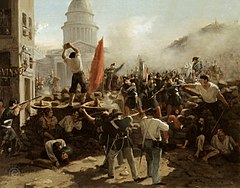1848 nî Kek-bēng
(Tùi Revolutions of 1848 choán--lâi)
1848 nî Kek-bēng sī Au-chiu tùi 1848 nî chē ūi kò-pia̍t hoat-seng ê chèng-tī hun-loān, sī Au-chiu le̍k-sú siōng siāng tōa hoān-ûi ê kek-bēng hong-pho.
| Part of the Age of Revolution | |
 Barricade on the rue Soufflot,[1] an 1848 painting by Horace Vernet. The Panthéon is shown in the background. | |
| Date |
12 January 1848 – 4 October 1849 (1 nî, 8 kó-gue̍h, 3 lé-pài koh 1 kang) |
|---|---|
| Location | Western, Northern, and Central Europe |
| Also known as |
Springtime of Nations, Springtime of the Peoples, Year of Revolution |
| Participants | People of Ireland, France, the German states, the Austrian Empire, Hungary, the Italian states, Denmark, Moldavia, Wallachia, Poland, and others |
| Outcome |
See Events by country or region
|
Tong-sî tāi-seng khí kek-bēng ê só͘-chāi sī 1 goe̍h ê Sicilia, kàu 2 goe̍h sî Hoat-kok mā khai-sí. Liáu-āu hiòng kui-ê Au-chiu sòaⁿ-hoat, tè-bé éng-hióng chhiau-kòe 50-ê kok-ka.
Chù-kái
siu-kái- ↑ Mike Rapport (2009). 1848: Year of Revolution. Basic Books. p. 201. ISBN 978-0-465-01436-1.
The first deaths came at noon on 23 June.
| Pún bûn-chiuⁿ sī chi̍t phiⁿ phí-á-kiáⁿ. Lí thang tàu khok-chhiong lâi pang-chō͘ Wikipedia. |